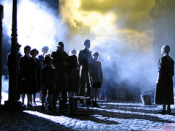"An Inspector Calls" was written in the 1940's after the class system had been broken down by war, and was set in 1912 when the class system was still in existence. The audience would have generally been made up of upper class people, they also would have related to Eric and Sheila as the language they used would have been similar to the audience. Priestley uses the characters Eric and Sheila to try to get the younger generation to change; Priestley's viewpoint is not to let the class system return.
The Inspector is a socialist and Birling is a capitalist, this reflects the contemporary clashes between capitalist and socialist ideals as the capitalists did not want to abolish the class system, because they believed that everyone should look after themselves, and not to be a socialist, like Priestley where everyone should look after each other.
Eric and Sheila represent the younger people in upper class society; they are willing to change as they are not as stubborn as the older people in the upper class society, with the exception of Gerald who is similar to Mr and Mrs Birling and does not change throughout the play, as he was born in to the upper class.
Mr and Mrs Birling represent the capitalists who do not want to change the way of the class system, so that everyone looks after each other. Mrs Birling does not work as she was born in to the upper class and Mr Birling provides for her and the family, as Mr Birling was not born in to the upper class he has married and worked his way in to it. The Inspector represents the socialist; he is Priestley's mouthpiece, so that everything that Priestley believes is said through the inspector. Eva/Daisy and Edna are...


